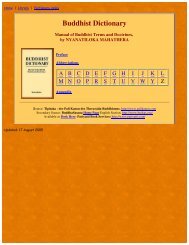The Three Basic Facts of Existence II: Suffering (Dukkha) - Buddhist ...
The Three Basic Facts of Existence II: Suffering (Dukkha) - Buddhist ...
The Three Basic Facts of Existence II: Suffering (Dukkha) - Buddhist ...
- No tags were found...
You also want an ePaper? Increase the reach of your titles
YUMPU automatically turns print PDFs into web optimized ePapers that Google loves.
Despair is like what remains in the pot after it has boiled over and is unable to do so any more,going on cooking in the pot till it dries up.”Everyone must taste something <strong>of</strong> the bitter brew <strong>of</strong> dukkha as they go through life, either theoccasional sorts described above or the three aspects <strong>of</strong> frequent dukkha which are describedbelow. <strong>The</strong>se are: “Association with the disliked is dukkha, separation from the liked is dukkha,not getting what one wants is dukkha.” While it may be said (from the point <strong>of</strong> view <strong>of</strong> ordinarytruth) that birth and death come round only once in a lifetime, that old age is restricted to onetime <strong>of</strong> life, and that disease for most people is only occasional, it must be admitted that thesethree are experienced by ourselves every day. So they may be called “everyday” or “frequentdukkha.” A lot may be learnt about oneself and one’s relations with dukkha just by observingthese three as they are known by oneself. “Association with the disliked” refers either tomeeting with unwished-for people (or animals), or it can refer to disagreeable things with whichone comes into contact, including doing work which does not please one, or having to endureweather which is not pleasant. This unwelcome contact with what is unloved is liable tostimulate in us a range <strong>of</strong> emotion from the slightest dislike round to the fiercest anger. If we donot have sufficient mindfulness then the mind is likely to be afflicted by these unwholesomestates. It is those which must be avoided, for however carefully we plan our lives we shall neverbe able to exclude “association with the disliked.”<strong>The</strong> same applies to “separation from the liked is dukkha” —it can never be avoided in thislife. If, in the previous case, we are liable to be wounded by the arrows <strong>of</strong> aversion, here we arelikely to suffer from the wounds made by greed. We covet and desire certain people, animalsand things and when our greed is not fulfilled then we must suffer this form <strong>of</strong> dukkha. In aworld where lust, attachment and desire rule and where separation is so common, how shall weescape this kind <strong>of</strong> dukkha? We swim in a sea <strong>of</strong> impermanence, we are impermanence, so it isinevitable that we must feel this dukkha frequently.So, in one way or another, we are certain to experience “not getting what one wants,” andunless we train ourselves in Dhamma this is sure to be dukkha. <strong>The</strong> Buddha has shown the verywide scope <strong>of</strong> this phrase, “not getting what one wants is dukkha.” He explained it as follows:“In beings subject to birth there arises the wish: ’O that we were not subject to birth, that birthmight never come to us!’ But this cannot be got by wishing. And not to get what one wants, thatis dukkha.” <strong>The</strong> same passage is then repeated for each <strong>of</strong> the types <strong>of</strong> the dukkha describedhere as “occasional.” If these passages were abbreviated, it would run like this: “In beingssubject to decay, disease, death, sorrow, lamentation, pain, grief and despair, there arises thewish: ’O that we were not subject to decay, disease, death. sorrow, lamentation, pain, grief anddespair, that they might never come to us!’ But this cannot be got by wishing. And not to getwhat one wants is dukkha.” <strong>The</strong> Buddha has emphasised by these repetitions that if we do notwant to experience the many sides to dukkha, mere wishes will not be enough to protect us.Only Dhamma practise and penetration can do this. <strong>The</strong> Visuddhimagga further explains bysaying that this is “the want <strong>of</strong> some unobtainable object,” and certainly more wishes for nobirth,no-decay, etc., are for unobtainable objects. This side <strong>of</strong> dukkha is not defined as referringto material objects though certainly it is very true in that case as well. How much we sufferwhen we do not get what we want! And how much suffering our miserable desires, whetherfulfilled or not, <strong>of</strong>ten bring on others!This, in brief, is the frequent dukkha that we are sure to encounter. If we consider the range <strong>of</strong>meaning covered here we can see that to translate dukkha as “suffering” may be misleading insome cases. This becomes even clearer when we look at the last clause in dukkha’s description,“the five grasped-at groups are dukkha.” This is the most subtle aspect <strong>of</strong> dukkha. Yet it is alsothe most constant aspect and the one “nearest” to ourselves. <strong>The</strong>se grasped-at groups are the11
















